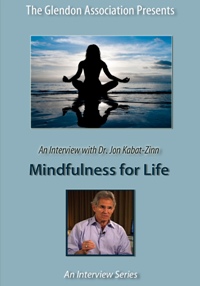Mindfulness – Hope for Changing the Future
Watch and read our exclusive interview with Jon Kabat-Zinn
So when the mind goes off, part of the discipline of this, you bring it back. If the mind goes off, you bring it back. Because you’ll notice if you focus on the breath, for instance, you can say to yourself, “OK. I think I’ll just focus on the breath.” Well, lots of luck. Within 30 seconds, your mind is going to be off someplace else or saying, “This is the stupidest thing I ever did. I’m wasting time. I could be checking my email. I could be tweeting. I could be on Facebook. Why am I sitting here with the breath? How boring.” Well, all those are just thoughts. If you don’t think the breath is boring, you can do a very little but important yogic experiment where you take your thumb and push it over one nostril and hold it there. You take the fore finger and you put it over the bridge of your nose and then you take the other finger and squeeze the other nostril really, really tight and then you keep your lips pursed and you see how long it takes before the next in breath becomes the only thing in the world that you have any interest in. And it won’t be that long. So if the breath is boring, it’s not the breath that’s boring, it’s your mind that’s boring in terms of how you are in relationship to things. And if that’s true for the breath, it’s true for everything else.
So when we learn to, if you will, go through what I call an “orthogonal rotation in consciousness” where everything is the same as it was the moment before, except you’ve shown up in your fullness, then, all of a sudden, the next moment is going to be very, very different. Because you were willing to show up for this one without an agenda. This is powerful stuff. Because if you have any hope of changing the future, the only way we could possibly change the future for the better is to own this moment as it is. Because if we don’t, then the mindlessness of this moment is going to bleed into the next moment and bleed into the next moment, bleed into the next moment and pretty soon you’re caught in a habit and highly conditioned patterns of behavior that are more mindless than mindful, more lacking in presence than present. So, we, we work at this. It’s a discipline: mind goes off, you bring it back; mind goes off, you bring back; mind goes off, you don’t want to bring it back, you bring it back anyway, against or working with the resistance of the aversion or whatever. And over time, something starts to build. And it’s a lot more interesting than a bicep. It’s a quality of equilibrium, a quality of clarity, a quality of calmness that’s not dependent on things being your way, going your way. It’s independent of what the Buddhist might call “causes and conditions.” OK? Now, we’re not idealizing this. We’re not saying, “Yes, I’ll never have any problems; I’ll never have any pain or I’ll never have any suffering or I’ll never have any anger.” No. You may yell and scream at various moments. But you’ll be able to catch that in awareness.
Order the Full DVD Interview:
 Mindfulness for Life: An Interview with Jon Kabat-Zinn
Mindfulness for Life: An Interview with Jon Kabat-Zinn
In this DVD, Dr. Jon Kabat-Zinn defines mindfulness as a way of “connecting to your life.” He discusses the “hard work” of living in the present moment, the personal and psychological impacts of developing a practice of mindfulness, and the benefits of utilizing mindfulness in therapy. He also touches upon mindfulness in parenting. Drawing upon his years of experience and research in the field of mindfulness, Dr. Kabat-Zinn offers an inspiring and instructive approach for mental health professionals and curious individuals alike.
Tags: awareness, jon kabat-zinn, mindfulness, mindfulness meditation









Leave a Reply